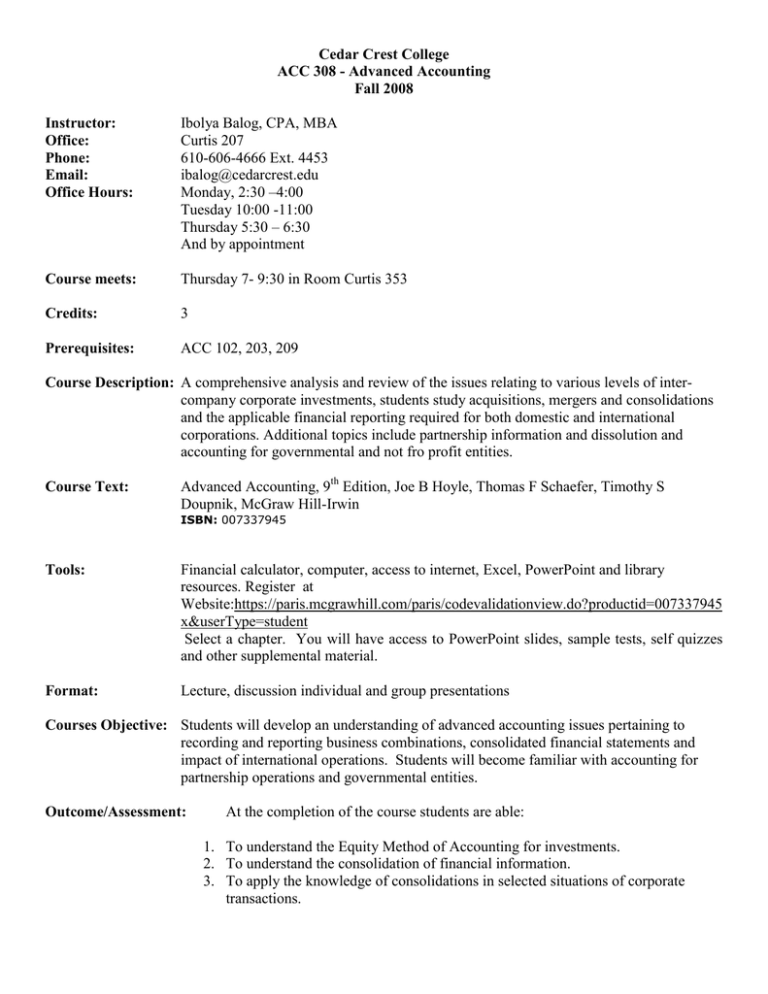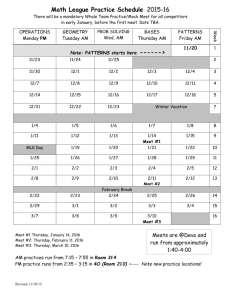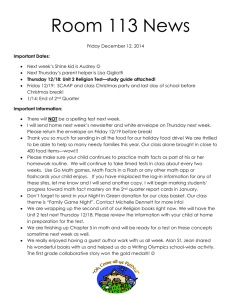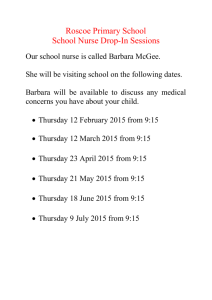Cedar Crest College ACC 308 - Advanced Accounting Fall 2008 Instructor:
advertisement

Cedar Crest College ACC 308 - Advanced Accounting Fall 2008 Instructor: Office: Phone: Email: Office Hours: Ibolya Balog, CPA, MBA Curtis 207 610-606-4666 Ext. 4453 ibalog@cedarcrest.edu Monday, 2:30 –4:00 Tuesday 10:00 -11:00 Thursday 5:30 – 6:30 And by appointment Course meets: Thursday 7- 9:30 in Room Curtis 353 Credits: 3 Prerequisites: ACC 102, 203, 209 Course Description: A comprehensive analysis and review of the issues relating to various levels of intercompany corporate investments, students study acquisitions, mergers and consolidations and the applicable financial reporting required for both domestic and international corporations. Additional topics include partnership information and dissolution and accounting for governmental and not fro profit entities. Course Text: Advanced Accounting, 9th Edition, Joe B Hoyle, Thomas F Schaefer, Timothy S Doupnik, McGraw Hill-Irwin ISBN: 007337945 Tools: Financial calculator, computer, access to internet, Excel, PowerPoint and library resources. Register at Website:https://paris.mcgrawhill.com/paris/codevalidationview.do?productid=007337945 x&userType=student Select a chapter. You will have access to PowerPoint slides, sample tests, self quizzes and other supplemental material. Format: Lecture, discussion individual and group presentations Courses Objective: Students will develop an understanding of advanced accounting issues pertaining to recording and reporting business combinations, consolidated financial statements and impact of international operations. Students will become familiar with accounting for partnership operations and governmental entities. Outcome/Assessment: At the completion of the course students are able: 1. To understand the Equity Method of Accounting for investments. 2. To understand the consolidation of financial information. 3. To apply the knowledge of consolidations in selected situations of corporate transactions. 4. 5. 6. 7. To gain an understanding of international accounting standards. To recognize the recording and reporting of foreign currency transactions. To understand partnership formation, operation and termination accounting To understand governmental and not for profit accounting Student evaluation and Grading: To do well in this course, you should read the textbook before class, think about what is discussed during class, and practice selected text questions after class. These are crucial steps to developing your understanding of the material in the course. Your understanding will be assessed through a variety of tasks, including class participation, homework, assignments; two take home tests, and a research paper. To succeed, you need to frequently read the Wall Street Journal, New York Times or other national/global newspaper/internet sources or magazines/publications including Fortune, Business Week, The Economist are good sources; and regularly attend and participate in class. Read, think and practice. Test 1 Test 2 Research Paper Class participation, attendance Total 25% 25% 25% 25% 100% Both exams consist of problems and essays and multiple choice questions that require knowledge of vocabulary, definitions and/or calculations to complete. They are based on text, homework, lectures and discussions. Class discussion is evaluated based on relevance and contribution to a topic. In an effort to have students gain new perspective, questions are encouraged. There are no extra credit opportunities. Classroom Expectations: All students are expected to attend class and contribute regularly to discussions. Students are expected to come to class prepared to discuss the assigned topics; therefore, they should read the assigned chapters prior to class. Students who miss class are expected to contact the professor and/or classmate. In addition, a missed class does not imply an automatic extension on an assignment’s due date. All assignments are due on the assigned due dates. Each student is required to use her/his Cedar Crest email account for communication with the professor and fellow students. Students should check their email regularly. Please turn off all cell phones, beepers and pagers prior to the start of class. If you use a notebook computer in class its use must be limited to class related purposes – not to check and answer email, instant messages or surf the internet. Appropriate classroom behavior is implicit in the Cedar Crest College Honor Code. Such behavior is defined and guided by the complete protection for the rights of all students and faculty to a courteous, respectful classroom environment. That classroom environment is free from distractions such as late arrivals, early departures, inappropriate conversations and any other behaviors that might disrupt instruction and/or compromise students’ access to their Cedar Crest College education. The Cedar Crest Honor Code states that, “Cedar Crest College students shall uphold community standards for academic and social behavior in order to preserve a learning environment dedicated to personal and academic excellence. Upholding community standards is a matter of personal integrity and honor. Individuals who accept the honor of membership in the Cedar Crest College community pledge to accept responsibility for their actions in all academic and social situations and the effect their actions may have on other members of the College Community.” (Cedar Crest College Catalog, page 33) “Incumbent from the Honor Code, academic integrity and ethical behavior provide the foundations of the Cedar Crest scholarly community and the basis for our learning environment. Cedar Crest College expects students to set a high standard for themselves to be personally and intellectually honest and to ensure that other students do the same. This standard applies to all academic work (oral, written or visual) completed as part of a Cedar Crest education.” (Cedar Crest College Catalog, page 33) Any confirmed instance of academic dishonesty can result in a failing grade for this course. Students with Documented Disabilities Students with documented disabilities who may need academic accommodations should discuss these needs with the professor during the first two weeks of class. Students with disabilities who wish to request accommodations should contact the Advising Center. Syllabus is subject to change with prior notice from the professor. Date Thursday 8/27 Thursday 9/3 Thursday 9/10 Thursday 9/18 Thursday 9/24 Thursday 10/1 Thursday 10/8 Thursday 10/15 Thursday 10/22 Topic Worldwide Accounting Diversity and International Standards Financial Reporting and the SEC Partnerships: Formation and Operation Partnerships: Termination and Liquidation Accounting and Reporting for Private Not-for-Profit Organizations Accounting for State and Local Governments The Equity Method of Accounting for Investments Test 1 due Consolidation of Financial Information Consolidations – Subsequent to the date of Acquisition Consolidated Financial Statements and Outside Ownership Consolidated Financial Statements – Intercompany Asset Transactions Variable Interest Entities, Intercompany Debt, Consolidated Cash Flows and Other Issues Reading Assignments Chapter 11 P 13 Chapter 12 Chapter 14 Chapter 15 Research Case 1 P 19, 20 P 16, 17 Chapter 18 Chapter 16 Chapter 17 Chapter 1 P 29, 31 Research Question 2 P 29, 30 P 32 33 P 11, 12 Chapter 2 P 12, 15, RA 2 Chapter 3 P 11, 15, 25 Chapter 4 P 20, 33 Chapter 5 P 21, 32 Chapter 6 P 39, Research Case IFRS Adoption by 2014 – Is It Possible -Paper Thursday 10/29 Thursday 11/5 Thursday 11/12 Thursday 11/19 Thursday 11/26 Thursday 12/3 Consolidated Financial StatementsOwnership Patterns and Income Taxes Segment and Interim Reporting Test 2 due Chapter 7 P 25, Research Case Chapter 8 Research Case 5 Foreign Currency Translation and Hedging Foreign Exchange Risk Translation of Foreign Currency Financial Statements Accounting for Legal Reorganizations and Liquidations Thanksgiving IFRS research paper due Chapter 9 P 40, Chapter 10 P 21, 22, 23 Chapter 13 P 22, 23, 28 Analysis Case 1





